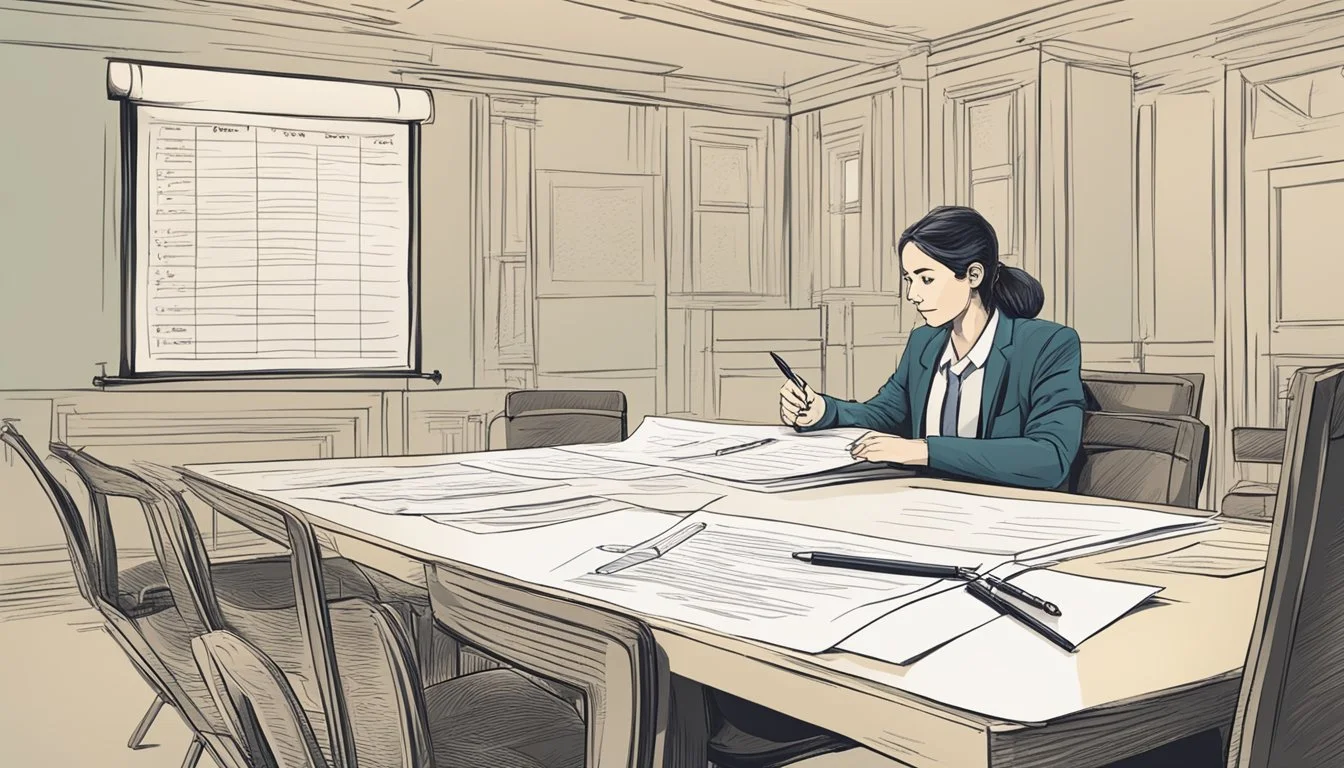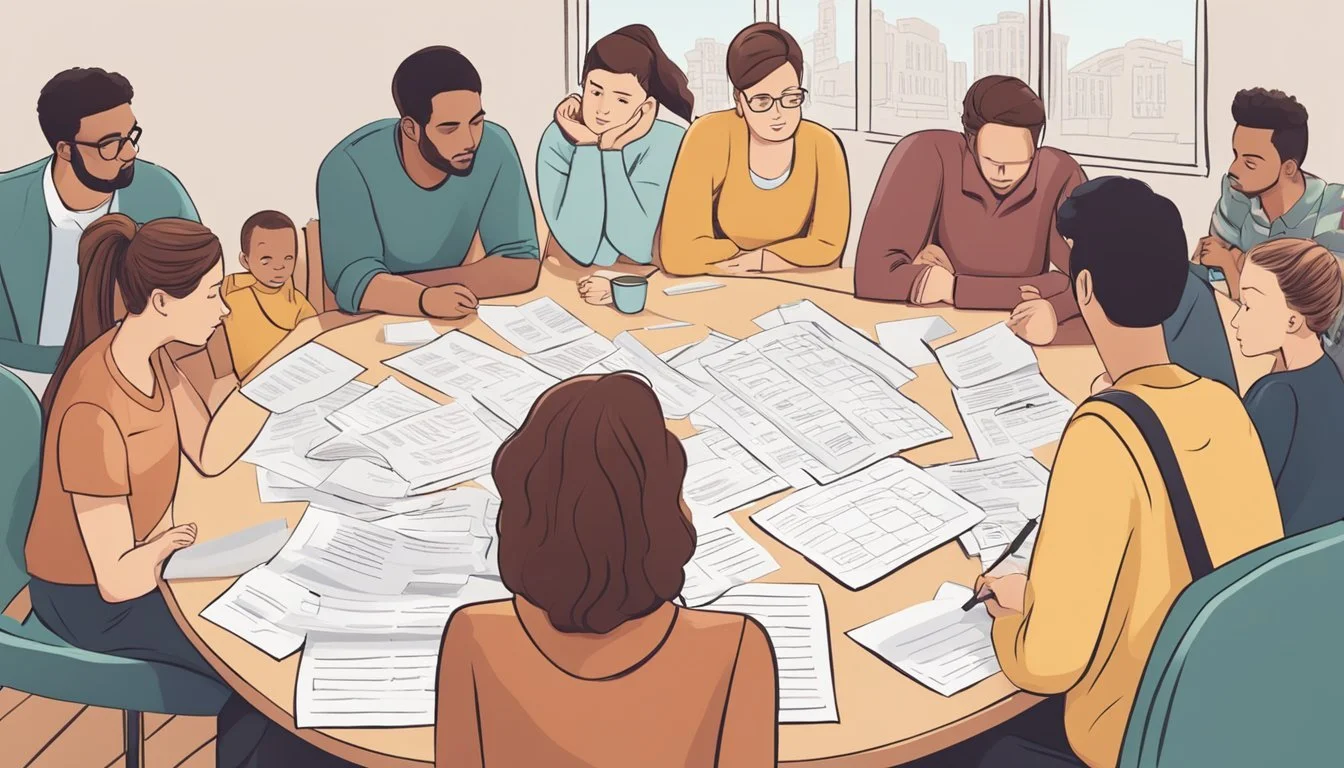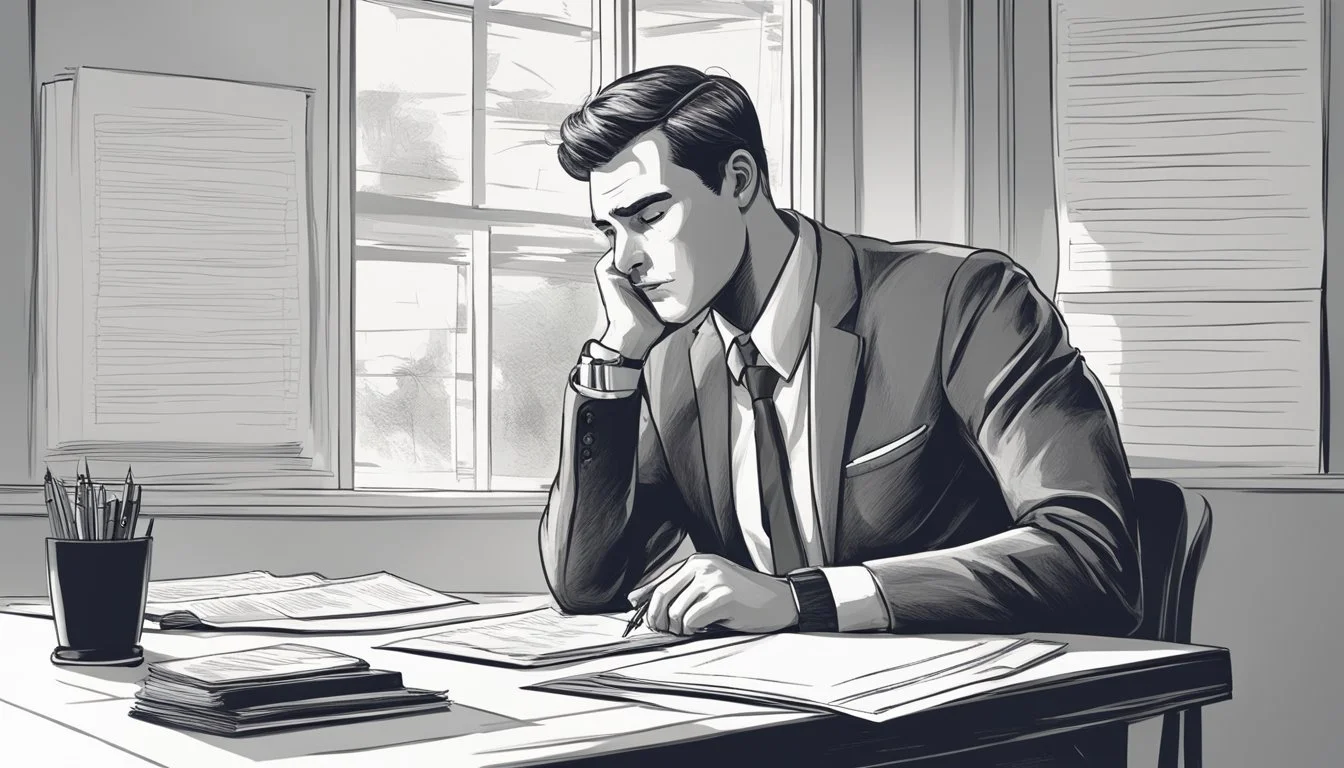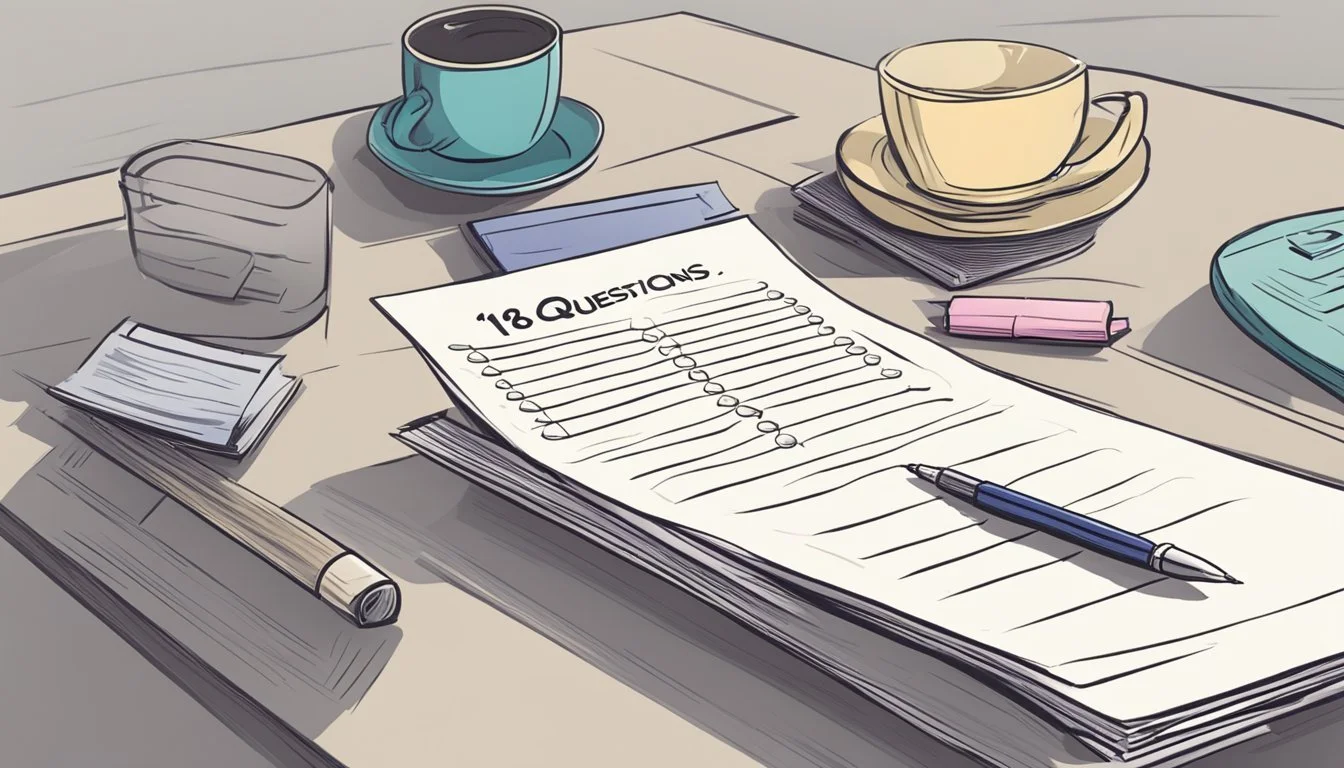18 Questions to Ask Before Considering a Breakup
Essential Insights for Your Relationship
Navigating the complexities of a relationship can be daunting, especially when considering whether to stay together or part ways. Relationships require constant effort and reflection, and sometimes it’s challenging to determine if you’re on the right path. Asking the right questions can provide clarity and help you make a more informed decision about your relationship's future.
Understanding what questions to ask yourself or your partner can reveal hidden insights into your relationship dynamics. This article aims to guide readers through important considerations to ensure they’ve thoroughly evaluated their situation before making any definitive decisions. Engaging in this introspection can lead to a more thoughtful and deliberate course of action.
1) Why am I considering this breakup?
Evaluating the reasons behind a breakup is crucial. It's important to identify what is driving these thoughts. He or she might be feeling consistently unhappy, which could stem from unresolved conflicts or unmet needs.
They might also feel a lack of connection or feel that the relationship is holding them back from personal growth.
External factors such as work stress or family issues may exacerbate the situation, making it harder to deal with relationship problems.
In some cases, they might question whether their partner is truly compatible long-term. Clarity on these points helps in understanding whether the relationship issues are transient or fundamental.
Relationships can be complex, and reflecting on these aspects helps in making a more informed decision.
For more insights, questions like how they have been feeling lately can be found here.
2) Have I communicated my concerns?
A critical step before deciding on a breakup is ensuring that you have clearly communicated your concerns to your partner. Clear communication is essential in any relationship and can often resolve underlying issues.
Direct conversations about feelings can help both partners understand each other better. Addressing your concerns without blaming allows for a constructive dialogue.
It is important to choose an appropriate time and place for this conversation. Avoiding distractions and speaking in a calm environment can make the discussion more effective.
Understanding and expressing your own emotions clearly is crucial. Use "I" statements to describe how you feel and what you need in the relationship.
Listening to your partner's perspective is equally important. Active listening can ensure that both parties feel heard and valued in the relationship.
Open discussion about concerns can lead to finding mutually agreeable solutions. This approach fosters a sense of partnership and collaboration.
In some cases, professional help such as couples counseling can provide a structured way to address and resolve concerns. Counselors can offer strategies to improve communication and understanding.
For more detailed questions to consider that can help facilitate these conversations, refer to 34 Questions To Ask Yourself Before You Break Up With Someone.
3) What are the main issues?
Identifying the main issues in a relationship is crucial before making any decisions. Key problems could include communication breakdowns, trust issues, or differing life goals. Recognizing these issues helps in determining whether they can be resolved or are deal-breakers.
Communication issues often stem from misunderstandings or lack of effective dialogue. Trust issues might arise from past betrayals or insecurities.
Different life goals, such as career aspirations or family plans, can lead to significant conflicts. By focusing on these core issues, couples can gain clarity on their relationships.
Thinking deeply about these primary issues provides a clearer perspective on whether the relationship can be improved or if it’s time to move on.
4) Have we tried to resolve our problems?
Evaluating whether efforts have been made to resolve problems is essential. Have both partners engaged in open, honest communication? This involves discussing issues without blame and actively listening to each other's concerns.
It’s crucial to determine if professional help was sought. Therapists can provide valuable insight and tools. Counseling can uncover root causes of issues that might not be apparent in day-to-day interactions.
Consider the duration and consistency of these efforts. Did both partners commit to making changes over a substantial period? Short-term efforts often lead to temporary improvements, but long-term commitment is needed for lasting change.
Reflect on the methods used to address problems. Were practical strategies employed to tackle specific issues? This includes setting clear goals and actively working towards them.
Lastly, assess if both partners feel that genuine efforts were made. Mutual recognition of effort is key to resolving issues. If one partner feels their efforts were unnoticed, it can lead to frustration and feelings of neglect.
5) Do I still love my partner?
One crucial question to ask is whether genuine feelings of love remain. It's important to differentiate between deep love and mere attachment.
Reflect on moments when your partner's presence brought joy. If those feelings are rare or absent, that's telling.
Consider whether you look forward to spending time together. If presence seems burdensome, love might have faded.
Ask yourself if your partner's happiness still matters deeply to you. Genuine love often includes caring for their well-being.
Assess if you enjoy supporting their dreams and ambitions. Mutual encouragement can signify lasting affection.
Take note of your response to their vulnerabilities. Love often reveals itself in how we handle each other's weaknesses.
If clarity is elusive, discussing feelings with a trusted confidant or therapist may help gain perspective.
Evaluating these aspects can provide insight into true emotional standing. For further guidance, you may visit 120 Questions to Ask Your Partner Before Ending a Relationship.
Understanding where your emotions stand is key to making thoughtful decisions.
6) Am I happy in this relationship?
Assessing happiness in a relationship is crucial. Consider if there are more positive or negative moments. Reflect on feelings when spending time together.
Is there laughter and joy, or frequent conflict and dissatisfaction? Examine if emotional needs are being met. A lack of fulfillment can indicate deeper issues.
Think about personal growth within the relationship. Do both partners support and encourage each other's development? Mutual growth often leads to greater happiness.
Evaluate communication. Open, honest dialogue is essential for a healthy relationship. Poor communication can result in misunderstandings and resentment.
Finally, consider how you feel when apart. If there’s relief rather than longing, there may be underlying problems to address.
If these reflections highlight persistent unhappiness, it may be time to reassess the relationship's future.
7) How do I feel when I'm with my partner?
Assessing feelings when spending time with a partner provides insight into the relationship's health. Do positive emotions like joy, comfort, and support come to mind?
Consider moments of shared laughter and mutual understanding.
Reflect on instances where their presence leads to stress, discomfort, or unease.
Pay attention to gut feelings and emotional responses in various scenarios.
Feelings during disagreements and conflicts offer additional clues. A relationship fostering safety and respect even in challenging times can contribute to long-term satisfaction and growth.
In contrast, feeling belittled or consistently misunderstood may indicate deeper issues.
Evaluating these feelings helps determine if the relationship aligns with personal needs and values.
8) Do I see a future with my partner?
Evaluating whether you see a future with your partner can significantly influence your decision about a breakup. Consider your long-term goals and whether your partner shares them.
Think about your shared visions for career, family, and lifestyle. If these major aspects align, it might indicate a stronger foundation.
Reflect on the day-to-day life you envision together. Do you share similar values, interests, and hobbies that blend well into a cohesive future?
Research shows that mutual personal growth and the ability to support each other's aspirations are crucial. Ask yourself if your partner contributes positively to your development and vice versa.
Positive input from friends and family can also be telling. Their observations might provide an unbiased perspective on the viability of your future together.
It's important to note red flags as well. Trust issues or differing core values might hint at potential long-term challenges.
Does your partner make you feel secure and understood? Emotional safety is a cornerstone of any durable relationship.
To explore more questions about gauging a relationship's future, refer to these 120 questions to ask your partner before ending a relationship.
9) Am I staying out of fear or obligation?
One important question to ask before a breakup is whether the motivation to stay is rooted in fear or obligation. Fear of being alone or fear of the unknown can be powerful deterrents to ending a relationship.
It's worth considering whether the sense of obligation is due to external pressures. Family or societal expectations might influence the decision to stay, even when the relationship isn't fulfilling.
Sometimes, the sense of duty to a partner’s well-being or fear of hurting them can make one hesitate. This form of obligation may prevent addressing personal happiness and needs directly.
Staying in a relationship out of fear or obligation often leads to long-term dissatisfaction. It’s essential to evaluate these feelings honestly to make a well-informed decision.
Exploring these reasons can help determine whether staying in the relationship is the healthiest choice for both partners. Reflecting on personal motivations can clarify whether the relationship is being maintained for the right reasons.
For more insight on this topic, visiting resources like Vessel can provide additional perspectives.
10) How will my life change post-breakup?
A breakup often reshapes several aspects of life. One immediate change involves living arrangements. If they shared a home, one or both partners might need to find new housing.
Emotionally, individuals may experience a rollercoaster of feelings. Sadness, relief, confusion, and anger can all surface at different times. It's helpful to mentally prepare for this emotional journey.
Financially, a breakup might require adjustments. Shared expenses and financial responsibilities come into focus. Those who were financially dependent on their partner may need to seek new sources of income.
Social dynamics also shift post-breakup. Mutual friends might feel caught in the middle. Social circles could change as individuals gravitate towards different support systems.
Career impacts may also occur. Emotional stress can affect workplace performance. Taking time to focus on mental well-being can be important for career stability.
Personal growth can follow a breakup. New hobbies, interests, and personal goals often emerge. Breakups can be catalysts for discovering one's strengths and capabilities.
Understanding these potential changes helps prepare for life post-breakup. It allows for better planning and coping strategies. For further insights, consider reading more about post-breakup changes.
11) What are my support systems?
Support systems are essential when navigating the complexities of a breakup. They provide emotional and sometimes physical assistance, helping one cope better with the situation.
Friends and family often serve as the first line of support. Their familiarity with the person's history and personality allows them to offer personalized advice and comfort.
Professional therapy or counseling can offer structured guidance from trained experts. Therapists provide a neutral perspective that friends and family may not be able to give.
Fitness and health groups can help maintain physical and mental well-being. Engaging in physical activities like yoga or group sports can reduce stress and improve mood.
Art and creative outlets offer another form of support. Engaging in activities such as painting, writing, or playing music can help process emotions and provide a therapeutic release.
Faith-based communities can also provide spiritual and emotional support. Shared beliefs and communal activities can offer comfort and a sense of belonging during tough times.
Each individual's support system will be unique. Assessing the available resources can help one make an informed decision about staying in or leaving a relationship.
For more on this, see emotional support systems that can help in coping with a breakup.
12) How will this affect my mental health?
Considering a breakup can have a profound impact on one's mental health. It is essential to understand how this decision might affect your emotional well-being. Breakups often lead to feelings of sadness, anxiety, and stress.
It is common for individuals to experience symptoms of depression and a decrease in self-esteem during this time. Engaging in regular physical activity can help ease these symptoms, as regular exercise is known to alleviate anxiety and depression, as suggested by Forbes Health.
The shock of a breakup can also lead to pain and disorganization in one's life. This stage can be particularly challenging for those who didn’t foresee the breakup, as described by mindbodygreen.
Surrounding yourself with supportive friends can help bolster your sense of self-esteem and aid in crisis management. Support systems play a crucial role in navigating the emotional aftermath of a breakup, as highlighted by Psychology Today.
Recognizing that feelings of loss and grief are a normal part of the process can also help in coping. These emotions might take time to process fully, and sometimes the realization of what has been lost only becomes apparent later, according to A Conscious Rethink.
Understanding these potential impacts on mental health can help in making a more informed decision about the future of the relationship.
13) What impact will this have on family and friends?
Breaking up can create ripple effects that touch family and friends. They may feel compelled to choose sides, causing discomfort and tension in social gatherings. This can strain relationships that were previously harmonious.
Family members often see the breakup as a loss, particularly if they had grown close to the partner. This sense of loss can lead to additional emotional stress for everyone involved. For friends who shared mutual connections, awkwardness may develop, affecting social dynamics and plans.
Children, if present, are significantly impacted. They might feel confused or even blame themselves. It's crucial to consider their emotional well-being and provide a supportive environment to navigate these changes.
Workplace relationships might also feel the strain if colleagues were aware of the relationship. Any shared social circles or joint activities can become complicated, requiring delicate handling to maintain professionalism.
14) Have I given this relationship enough time?
Assessing whether enough time has been invested in a relationship is key. Relationships require effort and patience to develop and grow. It’s crucial to reflect on whether both partners have dedicated sufficient time and energy to understanding and supporting each other.
Significant time is often needed to navigate through various life stages together. Rushing to end a relationship during challenging phases might overlook the natural ebb and flow that comes with long-term commitment.
It's also important to consider any external factors affecting the relationship. For instance, how work stress, family issues, or personal health problems might be impacting your relationship dynamics. Evaluating whether these factors might change over time is beneficial.
Finally, reflecting on the length of the relationship in the context of its developmental stage is useful. A newer relationship might require more time to establish solid foundations, while a longer-term relationship might be hitting a rough patch that could be resolved with mutual effort and patience.
For more insights on relationship timing, you can refer to these questions to ask yourself before breaking up. Making a thoughtful decision about the timing aspect can provide clarity on whether to proceed or reconsider the breakup.
15) What have I learned from this relationship?
Reflecting on personal growth is crucial in examining any relationship. Each connection offers unique insights into oneself and interpersonal dynamics.
One key aspect might be understanding emotional triggers. Recognizing what sparks joy or conflict can guide future interactions. This self-awareness can be instrumental in developing healthier communication habits.
Another essential lesson could be about boundaries. Relationships often test personal limits, teaching the necessity of setting and respecting boundaries. This knowledge helps in maintaining a balanced and respectful exchange between partners.
Learning about compromises and shared decision-making often becomes part of the experience. Successfully navigating differences in preferences and opinions fosters a cooperative spirit. This ability can strengthen partnership skills.
Personal growth could also include improving conflict resolution methods. Realizing effective ways to address disagreements constructively can reduce misunderstandings. These methods often lead to more effective resolutions.
Lastly, relationships teach empathy and patience. Understanding a partner's perspective and nurturing a compassionate outlook are invaluable skills. These qualities enhance all types of relationships, contributing to stronger, more supportive bonds.
Thus, each partnership offers critical lessons that can shape future interactions, contributing to personal development and emotional resilience.
16) Am I prepared for the consequences?
Deciding to end a relationship is rarely simple and comes with various consequences. It’s crucial to assess if one is ready for the emotional impact.
There might be feelings of sadness, loneliness, or guilt. Considering these emotions beforehand can help in managing them better.
Financial and living arrangements may also change. Evaluate if there are resources available to handle these changes smoothly.
Social circles can be affected too. Friendships might shift, and some social activities might change. Preparing for these transitions can make the process easier.
Lastly, think about the long-term effects. Will the decision bring peace in the long run, even if it’s challenging now? Reflecting on this can provide clarity.
17) Have I sought professional advice?
Seeking professional advice can be crucial when contemplating the end of a relationship. Therapists and counselors provide an objective perspective, helping to clarify emotions and offer coping strategies.
Consulting a professional can uncover underlying issues that might be affecting the relationship. These could include external stress factors like work or personal challenges that might be mitigated.
Sometimes individuals might not realize the full spectrum of their emotions or the impact of their actions. Professional advice can facilitate a deeper understanding, making informed decisions possible.
Couples therapy can also be beneficial. It offers a space for both partners to express their feelings and work through conflicts in a controlled environment.
If there is hesitation about ending the relationship, a professional can help evaluate whether all avenues to salvage it have been explored. Guidance from a therapist can sometimes rebuild connections that seemed lost.
Many find that professional advice delivers a sense of peace and confidence. It ensures that all possible solutions have been considered before arriving at a final decision.
18) Am I ready to be single again?
Evaluating readiness for being single again is crucial. It's essential to consider emotional and mental states. Breakups can be tough, and it's natural to feel vulnerable.
Assess feelings towards being alone. Craving solitude or feeling terrified of it can indicate different levels of readiness. Reflect on whether there's comfort in one's own company.
Gauge personal growth since the breakup. If they have regained confidence and self-worth, it might be a sign of readiness. Spending time with positive people can aid this process.
Consider whether there's still emotional attachment to the ex-partner. Lingering feelings can complicate singlehood. Ensuring emotional detachment is important before moving on.
Evaluate the desire for a new relationship. If they are rushing into something new to fill a void, it's wise to pause. Genuine readiness involves feeling complete as an individual.
Checking the comfort level with new social dynamics is also important. Being single often means navigating different social situations and relationships. Feeling prepared for this change is key.
Ask if there's genuine excitement about rediscovering oneself. Being single offers opportunities for exploration and growth. Enthusiasm for these prospects can indicate readiness.
Understanding Emotional Preparedness
Before considering a breakup, assessing one's emotional preparedness is crucial. Analyzing personal emotional states and identifying underlying feelings helps ensure decisions are made with clarity and insight.
Assessing Personal Emotional State
One of the first steps in emotional preparedness is assessing one's personal emotional state. This involves reflecting on current feelings and emotions towards the relationship and its challenges.
Key questions to ask:
Do I feel more anxious or calm when thinking about the future with my partner?
Am I experiencing persistent sadness, or are these feelings occasional?
What emotions surface when imagining life without my partner?
Maintaining an emotional journal can help track these emotions over time. By noting daily feelings and significant emotional shifts, patterns may emerge that clarify emotional readiness for a potential breakup.
In addition, self-care practices such as meditation, exercise, and adequate sleep support emotional clarity. Engaging in honest conversations with trusted friends or a therapist can also provide insights that influence the readiness to make such a significant decision.
Identifying Underlying Feelings
Identifying underlying feelings requires introspection into specific emotions and the triggers behind them. This goes beyond surface-level emotions and digs into the root causes.
Key areas to consider:
Is there underlying resentment or unresolved conflicts?
Are there feelings of incompatibility or unmet needs?
How do past experiences influence current feelings and decisions?
Using a feelings chart can aid in naming and clarifying these emotions. Sometimes, emotions like anger or frustration mask deeper feelings such as fear of loneliness or past hurts. Understanding these deeper emotions can guide more informed and compassionate decisions.
Therapeutic techniques such as cognitive-behavioral therapy (CBT) can be useful in unraveling these layers. Through CBT, individuals can identify negative thought patterns and behaviors that impact their emotional health and the decision to stay or leave a relationship.
Evaluating Relationship Dynamics
Assessing the intricacies of a relationship involves understanding communication patterns and the levels of trust and mutual respect between partners. It is essential to recognize how these factors influence the overall health and stability of the partnership.
Communication Patterns
Effective communication is the cornerstone of any strong relationship. It involves not only talking but also active listening. Recognizing how partners express their thoughts and feelings and how they respond to each other's needs is crucial. Transparent discussions can prevent misunderstandings and reduce conflicts.
In many relationships, repetitive arguments about the same issues can signal deeper communication flaws. Observing whether both individuals feel heard and valued during conversations is important. If one partner feels consistently dismissed or misunderstood, this can erode emotional intimacy.
Nonverbal cues, such as body language and facial expressions, also play a significant role. These signals can often reveal more than words and need to be interpreted correctly to truly understand a partner’s perspective. Hence, being attuned to both verbal and nonverbal messages enhances overall communication.
Trust and Mutual Respect
Trust forms the foundation of any meaningful relationship. It is built over time through consistent actions and behaviors that reinforce reliability and integrity. Evaluating whether trust has been broken, and if so, whether it can be repaired, is critical. Trust issues often manifest as jealousy, secrecy, or a lack of transparency.
Mutual respect is equally important. It involves acknowledging and valuing each partner’s individuality and opinions. Assess whether both partners regard each other as equals and whether there is a balance in decision-making and power dynamics.
Disrespect can appear in subtle ways, such as dismissive comments, condescending attitudes, or undermining a partner’s self-worth. Identifying these behaviors early can prevent long-term damage to the relationship. Clear, respectful boundaries and a commitment to honoring each other’s needs and desires are key indicators of mutual respect.
Considering Long-Term Implications
Evaluating the long-term implications of a breakup requires reflection on future goals and the emotional impact on both partners.
Future Goals and Alignment
Assessing if future aspirations align is vital. Different career paths, lifestyle choices, or desires for children can influence relationship longevity.
Discussing ambitions openly helps identify if both parties can support each other's dreams. For example, if one partner wants to travel frequently for work while the other prefers stability, compromises must be considered.
Understanding these differences is key to determining if a shared vision is possible. Without aligned goals, resentment may build over time, leading to dissatisfaction. Evaluating alignment can prevent future conflicts and ensure both individuals are working towards mutually beneficial objectives.
Emotional Impact on Both Partners
A breakup can significantly impact emotional well-being. Both partners should consider their capacity to cope with separation and the psychological aftermath.
Emotions like sadness, anger, and confusion are common. It is important to recognize these feelings and the potential need for professional support. Therapy sessions can assist in managing emotions and navigating the transition.
Understanding the emotional consequences helps in making an informed decision. Considering how the breakup will affect both individuals emotionally ensures that the decision to part ways is not taken lightly. Addressing emotional readiness can aid in smoother post-breakup recovery for both parties involved.















